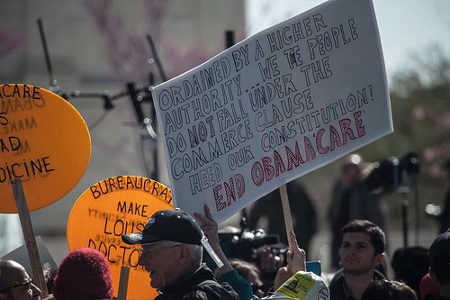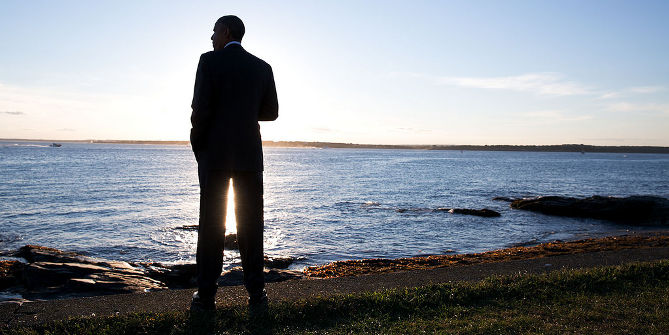USApp Managing Editor, Chris Gilson, looks at the best in political blogging from the Beltway. Our round-up of state blogs will follow on Saturday afternoon.
The Democratic Party, the GOP and ‘Bridgegate’
This week was a rough one for both parties. On Saturday, Lonely Conservative reports that in his weekly address, President Obama has once again attacked Republicans, accusing them of letting temporary unemployment insurance expire. Obama found himself on the defensive this week, however, after the former Defense Secretary, Robert Gates’ new book was said to have criticised the President’s leadership style. PoliticusUSA comments that the mainstream media has missed the point, as Gates’ has critiqued Obama for ‘micro-managing’ the Pentagon, something they say that is actually executive oversight. Meanwhile, with the decline of ‘Blue dog’ Democrats in Congress, National Journal writes that moderate Democrats are becoming extinct.

Democrats are not the only group facing extinction, according to PoliticusUSA, who write on Wednesday that the ‘era of Obama’ is driving the party to the brink. They say that GOP identification has fallen to a 25 year low of 25 percent in part because they have become the party of ‘No’, and the country’s general move to the left. Crooks & Liars reports that Republicans are becoming nervous that their Tea Party wing will obstruct the vote to extend the debt ceiling that will come in the next month or so. Concern over the Tea Party has led to the Chamber of Commerce to state this week that they will support primary candidates who will work within the legislative process, not against it, writes American Thinker on Thursday, something they say may only energize the group.
The main political story of this week is undoubtedly the controversy over the role of New Jersey Governor Chris Christie’s (R) staff in the closure of the George Washington Bridge between New York and New Jersey last September, now known as ‘Bridgegate’. We’ll cover the local aspects of the scandal in our state blog round up tomorrow, but there are also some national implications, as Christie has been tipped by many as having presidential ambitions in 2016. The Atlantic takes a close look at why the scandal may be dangerous for Christie’s reputation, writing that his lack of knowledge of the actions of his close aides puts his competency in question. Meanwhile, the National Journal wrote on Thursday that Christie is unlikely to get much support from fellow Republicans, many of who disagree with his style of politics. Meanwhile looking ahead to 2016, The Monkey Cage looks at how damaged Christie may well be.
Government and the Beltway
On Sunday, Daily Kos looks ahead to November’s Congressional mid-term elections, and using Texas and Georgia as case studies, they examine the implications the country’s demographic transition. The Hill’s Congress blog has a novel suggestion ahead of the 2016 election to cut through the ‘blizzard’ of communications during the campaign – a Presidential print debate. Roll Call’s Rothenblog looks at the youngest and oldest Congressional candidates of the current cycle, saying that they range from 25 to 66.
Meanwhile, Sabato’s Crystal Ball crunches the latest Census Bureau’s population projections and what they mean for House delegations across the states. Still on numbers, Outside the Beltway looks at why there are 435 seats in the U.S. House of Representatives, saying that the number has remained static since 1913, despite the country gaining more than 200 million people in that time, meaning that the quality of representation is a cause for concern. The Atlantic is also worried about the quality of representation, this time for Puerto Rico and Washington D.C., which send delegates to Congress, but lack voting rights.
As satisfaction with the two parties declines, a record number (42 percent) now identify as Independents, according to Crooks & Liars. However, The Monkey Cage takes issue with these figures, saying that many independents actually lean towards one party or another and the number of ‘pure’ independents is actually declining.
Congress’ agenda

Congress was back in session on Monday and Tuesday, after the holiday break. Wonkblog looks at the seven things that Congress needs to do in January – item number 1? Avoid a government shutdown. PoliticusUSA is not very optimistic about Congress’ ability to get things done in 2014, writing that it has only scheduled 97 work days this year before the mid-term elections, compared to 118 last year.
On Saturday, The Foundry writes that immigration reform may be on Congress’ agenda in 2014, saying that while some members have advocated a ‘step-by-step’ reform, this may be a problem if all the proposed ‘steps’ mean passing multiple bills which add up to the Senate’s bill – one would pave the way to citizenship for some undocumented immigrants. Meanwhile, Crooks & Liars critiques Republican Senator Rand Paul’s plan to let undocumented immigrants be able to work legally, but not vote, something Paul has said is meeting Democrats halfway. Finally on this issue, The Atlantic writes that allowing immigrants to vote may well not be a crazy idea, given their contributions to American society.
As 2013 drew to a close, emergency unemployment benefits to 1.3 million Americans were cut. Crooks & Liars reports on Tuesday that the Senate has voted to extend these benefits by three months. The bill is unlikely to be taken to the House; however, as Speaker John Boehner has stated that he will only hear a plan that includes measures to help bring people back to work.
Affordable Care

With ‘Bridgegate’ and the return of Congress dominating the news this week, the Obama administration’s flagship Affordable Care (Obamacare) program received less attention than in previous weeks, though there was still some commentary – mostly from conservative sources. On Tuesday, Hit & Run said that although national health spending had fallen in 2012, Obamacare can’t take the credit, as growth in spending began to fall from 2003. Meanwhile, The Lonely Conservative writes that it if people want decent health insurance, that they should ‘skip Obamacare’ and get a job at Walmart, which offers much cheaper premiums. The Foundry says that now that Obamacare has begun, it will be ‘digging in for the long haul’, by setting up and enhancing entitlements, including ‘broken ones’ like Medicaid. On Thursday, Wonkblog carries an interview with Robert Laszewski, president of Health Policy and Strategy Associates, on Obamacare, who says that the program’s fundamental problem is that it “doesn’t really meet the needs of healthy people and middle-class people.” Perrspectives also takes a look at the mechanics of Obamacare, writing that the U.S. should treat healthcare like a utility (as other countries do), rather than a market.
Foreign policy and defense
Former Defense Secretary Robert Gates’ memoirs were also widely reported on this week, because of their foreign policy commentary. National Journal reports that Gates has said that former President George Bush’s invasion of Iraq undermined U.S. involvement in Afghanistan. They also report that Gates was troubled by Obama’s apparent lack of trust for his military commanders. Meanwhile, Red State says that Obama’s weak policy on Al Qaeda in Iraq shows that he has turned his back on America’s involvement there.
Informed Comment has some harsh words for Washington’s ‘national security state’, saying that it now costs nearly one trillion dollars a year, and resembles a ‘faith-based system’.
The economy and society
The past week has seen record snowstorms across the U.S. with a great deal of infrastructure disrupted. Wonkblog points out that cold weather such as what has been recently experienced isn’t just an inconvenience, it can kill you.
This week is the 50th anniversary of Lyndon Johnson’s famous speech, declaring the ‘War on Poverty’. The Atlantic reflects on this milestone, and wonders why the war is not being won, as poverty remains stubbornly high. Meanwhile the National Journal says that the lack of success in the 50-year old war on poverty (which has cost more than $20 trillion since) shows that new ideas and politics are required.
Last week saw the first sales of legal marijuana in Colorado. The Atlantic looks at the concerns of some conservative thinkers that retailers may target the poor and minorities.
On Saturday, The Foundry says that Sandra Stotsky, a leading educational reform scholar has come out against Common Core national education standards. They report that the national standards won’t help students get in to selective colleges. Wonkblog covers another program aimed at encouraging students and research – the International Space Station. They write that the Obama administration has announced this week that it wants to extend the life of the orbital facility for four more years, until 2024.
And finally…
The National Journal has a guide for those keen on ‘guerrilla ice skating’ in Washington, given the very cold weather.
Crooks & Liars writes on Monday that Congress has now effectively told people to drive their cars, and to not take the train, with their failure to extend a public transport tax benefit of $245 per month. This has now been slashed to $130 per month, while drivers get an $250 tax break.
Please read our comments policy before commenting.
Note: This article gives the views of the author, and not the position of USApp– American Politics and Policy, nor of the London School of Economics.
Shortened URL for this post: http://bit.ly/1ktvKtW






